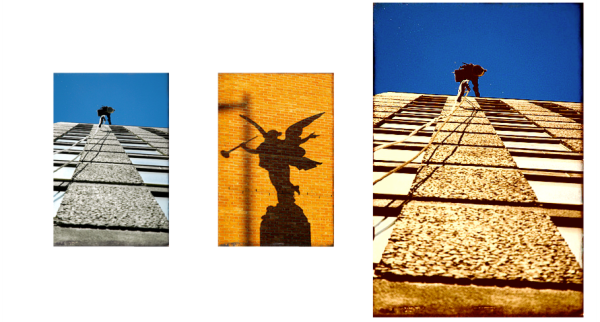Quick links to procedures on this page:
An underpainting is a version of the photo in which you adjust the photo’s colors, tones, and sharpness. The purpose of the underpainting is to prepare it for auto-painting. For example, you can darken colors to simulate the colors used in an 18th-century painting, or you can soften colors to simulate the colors found in watercolor paintings. After retouching a photo, you must clone it to preserve it and prepare it for auto-painting. For more information, see Auto-cloning photos.
Choosing an underpainting method
Depending on the effect you want to achieve, you can choose one of the following methods for creating an underpainting:
One method you can use to prepare a photo for painting (left) is to choose a source image (center) that contains the colors and tones you want to use. The color and tone of the source image can be applied to your photo to create an underpainting (right).
| 2 . |
Choose Window  Auto-Painting Panels Auto-Painting Panels  Underpainting. Underpainting. |
| 3 . |
In the Underpainting panel, choose a preset from the Color Scheme list box. |
| 5 . |
In the Photo Enhance area, move any of the following sliders: |
|
• |
Brightness — lets you brighten or darken the photo |
|
• |
Contrast — lets you increase or decrease the difference in tone between the dark and light areas of the photo |
|
• |
Hue — lets you shift the color balance of the photo. For example, you can correct a color cast or apply a cast to create a special effect. |
|
• |
Saturation — lets you adjust the vividness of colors |
|
• |
Value — lets you brighten or darken the photo by using the HSV color space values |
|
• |
Smart Blur — lets you adjust the level of detail in the photo. More detail is maintained in high-contrast areas than in low-contrast areas. |
| 6 . |
Click the Apply Underpainting button  to create the underpainting. to create the underpainting. |

Before clicking the Apply Underpainting button  , you can return the photo to its original state by clicking the Reset Underpainting button
, you can return the photo to its original state by clicking the Reset Underpainting button  .
.
You can add an edge effect to simulate the unpainted edge of a canvas or to create a frame effect by choosing an edge from the Edge Effect list box and moving the Amount slider.
| 1 . |
In the Underpainting panel, adjust the Photo Enhance sliders to achieve the style you want. |
| 3 . |
In the Save Preset dialog box, type a name for your preset. |

You can delete a preset by choosing it in the Photo Enhance list box and clicking the Delete Preset button  .
.
| 3 . |
In the Underpainting panel, choose the filename for the source image from the Color Scheme list box. |

, you can return the photo to its original state by clicking the Reset Underpainting button
.
.